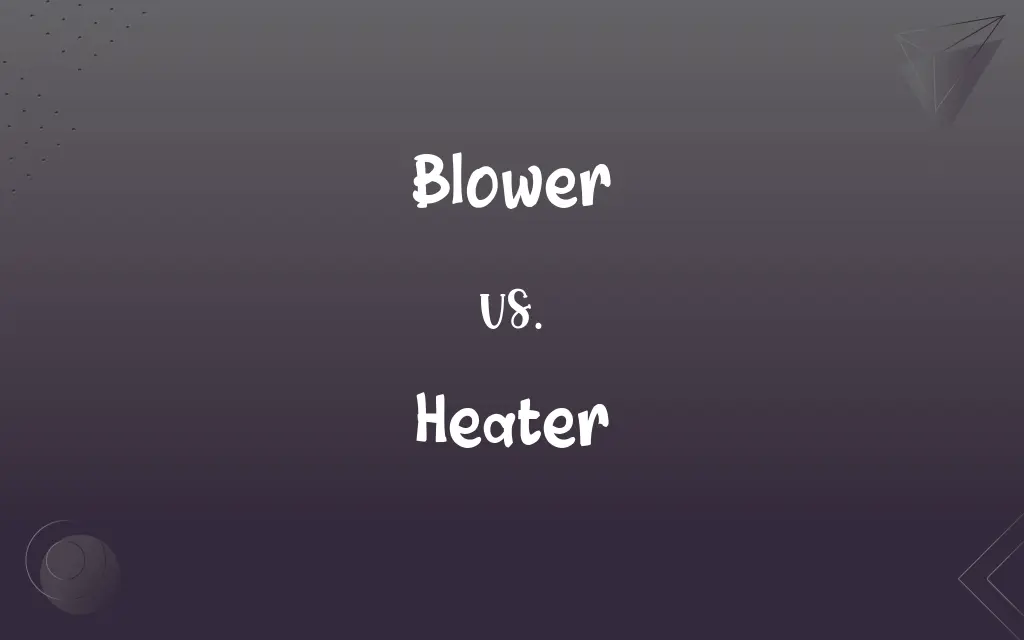Blower vs. Heater: What's the Difference?
Edited by Aimie Carlson || By Harlon Moss || Updated on October 25, 2023
A blower circulates air, while a heater warms it.

Key Differences
A blower is a device primarily designed to move air or gas from one place to another. It doesn't necessarily change the temperature of the air. On the other hand, a heater is designed to increase the temperature of its surroundings, providing warmth.
While blowers can be found in various applications, such as in vehicles for ventilation or in industrial settings to remove dust, heaters are mainly used in environments where raising the temperature is necessary, such as homes during winter or in cars' heating systems.
A blower's main function is to provide ventilation, improve air circulation, or transport materials. It does not have elements to warm the air. Conversely, a heater contains elements or systems specifically for heating purposes, using electricity, gas, or other fuels.
Some devices combine both blower and heater functions. For instance, many space heaters have blowers to distribute the warmed air throughout a room. Yet, it's important to note that while all heaters with fans have blowers, not all blowers are part of heaters.
To summarize, while both blowers and heaters can affect the air in an environment, they serve distinct purposes. Blowers focus on movement, whereas heaters focus on temperature increase.
ADVERTISEMENT
Comparison Chart
Primary Function
Moves air
Warms air
Typical Uses
Ventilation, air circulation
Providing warmth, raising temperature
Energy Source
Electricity mainly
Electricity, gas, other fuels
Contains Heating Element
No
Yes
Combined Devices
Can be part of devices with heaters
Can incorporate blowers for air distribution
ADVERTISEMENT
Blower and Heater Definitions
Blower
A device that moves air or gas.
The blower in the computer keeps it from overheating.
Heater
An instrument for generating heat.
The car's seat heater is a blessing in cold weather.
Blower
A fan used to accelerate airflow.
The blower helps distribute warm air throughout the room.
Heater
A device that produces and emits heat.
The room got warm quickly thanks to the efficient heater.
Blower
An instrument for producing a current of air.
The technician fixed the car's air conditioning blower.
Heater
Equipment that provides warmth to its surroundings.
During winter, the space heater becomes a household essential.
Blower
Equipment that circulates air to improve ventilation.
The greenhouse uses a blower to ensure plants receive adequate airflow.
Heater
An appliance used to raise the temperature of something.
She turned on the water heater before taking a bath.
Blower
A machine for forcing air on a fire.
The blacksmith's forge had a powerful blower to intensify the heat.
Heater
A device that uses energy to produce heat.
The portable heater uses both electricity and batteries.
Blower
One that blows, especially a mechanical device, such as a fan, that produces a current of air.
Heater
An apparatus that heats or provides heat.
FAQs
Is it safe to leave a heater on overnight?
Safety depends on the heater type; some are designed for extended use, but always consult the manual.
Does a blower consume a lot of electricity?
Consumption varies by model, but typically, blowers use less electricity than heaters.
What is the primary function of a blower?
A blower's main job is to move and circulate air or gas.
How does a heater work?
A heater works by using energy to produce and emit heat.
How do I increase the efficiency of my heater?
Ensure regular maintenance, proper insulation, and use thermostats for regulation.
Can blowers be used to cool areas?
Yes, blowers can improve air circulation, which can help cool areas.
Can I use a heater outside?
Some heaters are designed for outdoor use; always check the manufacturer's guidelines.
Are there blowers specifically for cars?
Yes, cars have blowers for air conditioning and ventilation.
Why is my blower noisy?
Dust, debris, or mechanical issues could be the cause; it might need cleaning or repair.
What's the difference between a blower and a fan?
Both move air, but blowers typically generate a more concentrated airflow.
Can I use a blower to dry clothes?
While not typical, a blower can be used for quick drying due to its air circulation capability.
Why does my heater smell when turned on?
Dust burning off the heating element can cause a smell; if persistent, consult a professional.
Can heaters also act as coolers?
Some devices, like HVAC systems, have both heating and cooling functions.
Why is my blower not working?
It could be due to power issues, blockages, or mechanical failures; a technician can diagnose it.
Is it safe to touch a heater when it's on?
Typically, no. The surface can be hot; always use caution.
Are there industrial-grade blowers?
Yes, industrial blowers are used in factories for ventilation and material transportation.
How often should I service my blower?
It depends on usage, but regular checks and annual maintenance are advisable.
Can heaters cause fires?
If not used properly or if malfunctioning, heaters can be fire hazards.
How long do heaters typically last?
With proper maintenance, many heaters can last 10-15 years, depending on the model and usage.
How do I know if my heater is energy efficient?
Check its energy rating or consult the manufacturer's specifications.
About Author
Written by
Harlon MossHarlon is a seasoned quality moderator and accomplished content writer for Difference Wiki. An alumnus of the prestigious University of California, he earned his degree in Computer Science. Leveraging his academic background, Harlon brings a meticulous and informed perspective to his work, ensuring content accuracy and excellence.
Edited by
Aimie CarlsonAimie Carlson, holding a master's degree in English literature, is a fervent English language enthusiast. She lends her writing talents to Difference Wiki, a prominent website that specializes in comparisons, offering readers insightful analyses that both captivate and inform.































































